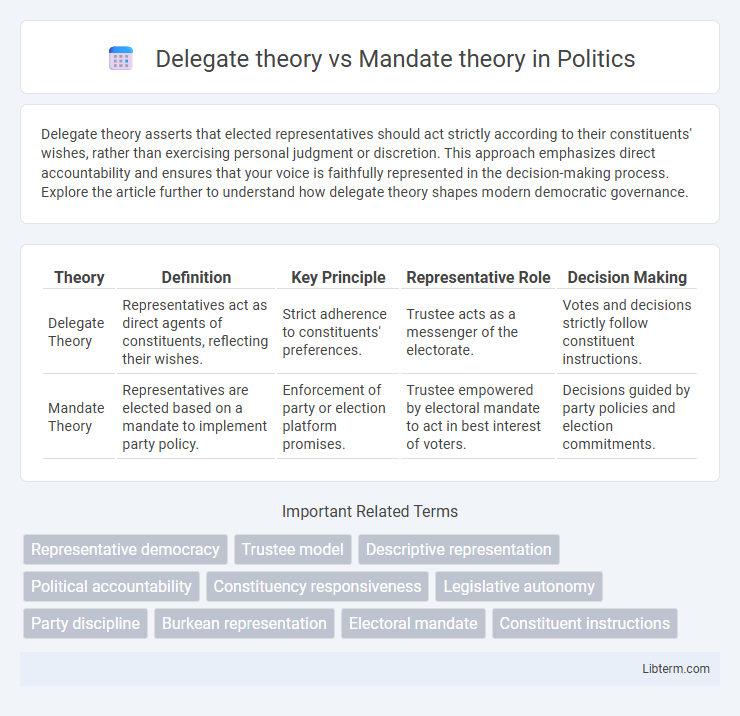Delegate theory asserts that elected representatives should act strictly according to their constituents' wishes, rather than exercising personal judgment or discretion. This approach emphasizes direct accountability and ensures that your voice is faithfully represented in the decision-making process. Explore the article further to understand how delegate theory shapes modern democratic governance.
Table of Comparison
| Theory | Definition | Key Principle | Representative Role | Decision Making |
|---|---|---|---|---|
| Delegate Theory | Representatives act as direct agents of constituents, reflecting their wishes. | Strict adherence to constituents' preferences. | Trustee acts as a messenger of the electorate. | Votes and decisions strictly follow constituent instructions. |
| Mandate Theory | Representatives are elected based on a mandate to implement party policy. | Enforcement of party or election platform promises. | Trustee empowered by electoral mandate to act in best interest of voters. | Decisions guided by party policies and election commitments. |
Introduction to Delegate Theory and Mandate Theory
Delegate theory asserts that elected representatives act strictly according to the wishes of their constituents, serving as a direct voice without personal interpretation. Mandate theory holds that representatives are entrusted to use their judgment to make decisions on behalf of their electorate, reflecting the broader interests of the public. Understanding these contrasting political theories explains the dynamics between voter control and legislative discretion in democratic governance.
Defining Delegate Theory
Delegate theory asserts that elected representatives are obligated to act strictly according to the wishes and instructions of their constituents, effectively serving as direct agents without autonomous decision-making power. This political theory emphasizes the primacy of constituent control over legislative actions, limiting representatives to carrying out the expressed preferences of those who elected them. The delegate model contrasts sharply with mandate theory, which allows representatives greater discretion to interpret constituents' interests within broader policy frameworks.
Understanding Mandate Theory
Mandate theory asserts that elected representatives are granted authority by the electorate to make decisions on their behalf, reflecting the voters' overall will rather than individual preferences. This theory emphasizes trust in representatives' judgment and expertise, allowing flexibility in decision-making to achieve the electorate's broader interests. Understanding mandate theory highlights the balance between democratic accountability and effective governance in representative democracies.
Historical Origins of Both Theories
Delegate theory traces its historical origins to the political philosophies of Thomas Hobbes and Jean-Jacques Rousseau, emphasizing that representatives act strictly according to the direct instructions of their constituents. Mandate theory emerged in the 19th century alongside the development of modern democratic states, advocating that elected officials are entrusted with a mandate to use their judgment within the framework of the electorate's general will. Both theories reflect evolving ideas about the nature and limits of political representation rooted in the transition from absolutist to popular sovereignty.
Key Differences Between Delegate and Mandate Theories
The Delegate theory asserts that elected representatives strictly follow the instructions of their constituents, acting as direct agents without personal discretion in decision-making. In contrast, the Mandate theory grants representatives the authority to interpret and act upon the broader mandate given by voters, allowing them to exercise judgment in shaping policies. Key differences include the Delegate theory's emphasis on constituent control versus the Mandate theory's focus on representative autonomy in political decision processes.
Advantages of Delegate Theory
Delegate theory empowers representatives to act strictly according to their constituents' preferences, ensuring political accountability and direct representation. This model fosters transparency and reduces the risk of elected officials imposing personal biases or agendas. By adhering closely to voter mandates, delegate theory strengthens democratic legitimacy and public trust in governmental decision-making.
Benefits and Criticisms of Mandate Theory
Mandate theory benefits include promoting accountability by ensuring representatives act according to voters' wishes, thereby enhancing democratic legitimacy and responsiveness. Critics argue this theory limits representatives' ability to exercise personal judgment, potentially leading to rigid decision-making and undermining effective governance during complex or unforeseen circumstances. Mandate theory may also oversimplify voter preferences, ignoring the diversity of opinions within constituencies.
Real-World Examples of Both Theories in Practice
Delegate theory is exemplified in direct democracy settings, such as Switzerland's frequent referendums, where representatives act according to explicit voter instructions. Mandate theory appears prominently in parliamentary systems like the United Kingdom, where elected officials exercise judgment and make decisions based on broader party policies and national interests. These practical applications highlight the contrast between strict voter adherence and representative discretion in governance.
Delegate vs Mandate Theory: Impacts on Democratic Representation
Delegate theory emphasizes representatives acting strictly according to their constituents' wishes, ensuring direct reflection of public opinion in democratic decision-making. Mandate theory grants representatives more autonomy to use personal judgment while pursuing the general policy platform endorsed by voters, potentially enhancing effective governance but risking disconnect from immediate public preferences. The impact on democratic representation hinges on balancing responsiveness to voter demands with the need for informed, strategic policy decisions.
Conclusion: Choosing Between Delegate and Mandate Theory
Choosing between Delegate and Mandate Theory depends on the desired balance between representative independence and direct voter control. Delegate theory emphasizes strict adherence to constituents' wishes, promoting accountability through direct responsiveness. Mandate theory grants representatives discretion to use their judgment, enabling informed decision-making while trusting elected officials to act in the public interest.
Delegate theory Infographic

 libterm.com
libterm.com